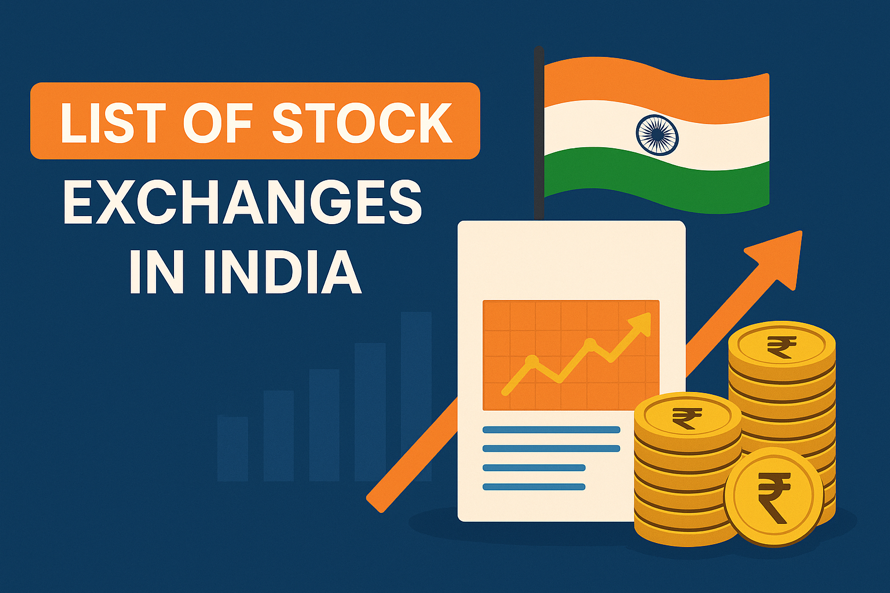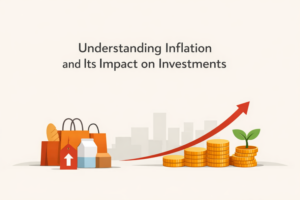List of stock exchanges in India: A guide

The Indian stock market is one of the oldest among developing economies. The number of trades is increasing because the exchange system is becoming more accessible to investors, and the market regulator is better at protecting investors. Technological improvements, such as trading through mobile apps, have increased the number of buyers and trades manifold.
Those wondering how many stock exchanges are in India might be surprised to know that the country is home to several stock exchanges, big and small. In this blog post, we’ll discuss some of the major stock exchanges in India.
List of stock exchanges in India
The Indian stock market is expected to be worth US$5.32tn by 2025, according to an estimate. It is an active and vital part of the country’s financial system. We’ll answer your question, “How many stock exchanges are there in India?” The following are the popular ones.
1. Bombay Stock Exchange (BSE)
BSE is Asia’s oldest stock market, which has been around since 1875 and was called The Native Share & Stock Brokers Association. It is one of the two big stock markets in the country, which is located on Dalal Street in Mumbai. The company was started by Mr. Premchand Roychand, also known as the Cotton King, the Bullion King, and the Big Bull. In 1986, the Sensex was created. Besides, it is the first stock index to identify the top 30 companies across more than 10 industrial sectors.
In addition to the Sensex, BSE has other major indexes such as BSE 100, BSE 200, BSE MIDCAP, BSE 500, BSE SMLCAP, BSE Pharma, BSE PSU, BSE Auto, BSE FMCG, and BSE Metal. Traders trade stocks, futures, options, and other alternatives. Over the past few years, BSE has added commodities contracts to its list of products.
2. National Stock Exchange (NSE)
NSE is newer than BSE, and it has grown to become India’s largest stock market. Besides, NSE transformed trading by replacing the old paper-based payment method with a computer trading tool. It was founded in 1992 and approved by SEBI in 1993. This made buying faster, more open, and available to a broader audience. The NSE started the Nifty 50 Index in 1995–96, which lists the top 50 companies that trade on the exchange.
The NSE has other indexes besides the Nifty 50. They are the Nifty Next 50, the Nifty 500, the Nifty Midcap 150, the Nifty Smallcap 250, and the Nifty MidSmallcap 400. They were integral in creating the National Securities Depository Limited (NSDL), which lets buyers hold and trade stocks online. The NSE mainly deals in stocks, futures, commodities, and currencies.
3. Multi-Commodity Exchange (MCX)
When searching how many stock exchanges are there in India, you cannot miss the Multi-Commodity Exchange (MCX). India’s top spot for trading commodity contracts is online at the Multi Commodity Exchange of India Limited (MCX). It has been around since November 2003. Besides, the Securities and Exchange Board of India (SEBI) regulates it and ensures it is open, follows the rules, and protects investors.
MCX makes it possible to trade a wide range of goods. Some are valuable metals like gold and silver. Then there are industrial metals like copper, aluminum, zinc, and lead. Besides, you can trade energy goods like natural gas, crude oil, and various farming products. It’s a valuable tool for hedgers, traders, and investors who want to enter the commodities market because it has a wide range of investments.
4. National Commodity and Derivatives Exchange (NCDEX)
The National Commodity & Derivatives Market Limited (NCDEX) is India’s largest online commodity market. Its primary focus is on farming and some non-agricultural goods. NCDEX was established on April 23, 2003, and started operations on December 15, 2003. This exchange is essential to the Indian commodity exchange market because it gives farmers, sellers, packers, and investors a transparent and efficient trading platform.
Many products, such as commodity futures, options on things, and index futures, are on the market. These tools help people in the market handle price risks, make wise business choices, and find fair prices. NCDEX focuses on agricultural goods, which play a significant role in helping India’s rural economy. It connects farmers with national markets and makes it easier for them to get better prices.
5. India International Exchange (India INX)
If you’re wondering how many stock exchanges are there in India, remember that India International Exchange (India INX) stands out as one of the prominent commodity exchanges. India INX is the country’s first international stock market, which is a unit of the Bombay Stock Exchange. It is housed at the GIFT City International Financial Services Centre in Gujarat.
6. NSE IFSC
NSE Indices Limited is an important part of the National Stock Exchange of India (NSE). It was formerly India Index Services & Products Limited (IISL), which plays a key role in creating and managing indices for the Indian stock markets. The company has a complete set of more than 100 indices to meet the needs of different market groups.
NSE Indices Ltd. aims to make markets open and efficient to help people make smart business decisions. Asset managers, market players, and academics trust the organization’s indices to measure success, build portfolios, and handle risk. NSE Indices Limited has become a trusted provider of index solutions by constantly coming up with new ideas and following best practices from around the world.
7. Indian Commodity Exchange (ICEX)
The Indian Commodity Exchange Limited (ICEX), which opened in 2017, is a relatively new player in India’s commodity trade scene. Its goal is to offer a straightforward, quick, and affordable way to trade many market swaps. The Securities and Exchange Board of India (SEBI) oversees ICEX and ensures it follows strict rules for control and compliance to keep the market running smoothly.
A group of owners, including well-known state and private companies, supports the exchange. Some of them are Gujarat Agro Industries Corporation, Gujarat State Agricultural Marketing Board, MMTC Ltd., Bajaj Holdings & Investment Limited, and NAFED. As ICEX works to become the best place to learn about commodity prices and protect your investments, it is emerging as a major player in India’s growing commodity market.
8. Calcutta Stock Exchange (CSE)
You would have got a good idea of how many stock exchanges are there in India by now. Now, one exchange that you should know about is Calcutta Stock Exchange Limited (CSE). It has been around since 1908.
The NSE ended its trade deal with the CSE on July 18, 2023. Then, on November 17, 2023, a division bench released the stay on closing, letting some activities continue until the final date. All deals on the CSE got closed by November 28, 2024. So, you may say that CSE is not as important as before, but it still has a small role in eastern India, especially in and around Kolkata.
9. Metropolitan Stock Exchange (MSE)
MSE is a well-known stock exchange in India. It can now be used as a digital trade tool for debt markets, futures and options markets, and capital markets. The exchange has a live trade tool for all business types except small and medium-sized businesses (SMEs). Metropolitan Clearing Corporation of India Limited (MCCIL) is a subsidiary of the exchange and handles all deals on the exchange.
The Metropolitan Stock Market of India Limited (MSE) is a government-run stock market, and the Securities and Exchange Board of India (SEBI) oversees its functioning.
Conclusion
Now, you have a clear idea of how many stock exchanges there are in India. Thanks to their blend of traditional and digital platforms, these platforms enable investors to buy and sell equity, commodities, and derivatives. As trading becomes more sophisticated, these institutions are expected to play a vital role in boosting India’s economy and global market presence.
FAQs
Q. Which stock exchange should investors/traders transact in India?
Indian stock market investors mostly trade on the Bombay Stock Exchange (BSE) and the National Stock Exchange (NSE). For commodity trading, the popular ones are the Multi Commodity Exchange (MCX), the National Commodity and Derivatives Exchange (NCDEX), and the Indian Commodity Exchange (ICEX).
Disclaimer
The stocks mentioned in this article are not recommendations. Please conduct your own research and due diligence before investing. Investment in securities market are subject to market risks, read all the related documents carefully before investing. Please read the Risk Disclosure documents carefully before investing in Equity Shares, Derivatives, Mutual fund, and/or other instruments traded on the Stock Exchanges. As investments are subject to market risks and price fluctuation risk, there is no assurance or guarantee that the investment objectives shall be achieved. Lemonn (Formerly known as NU Investors Technologies Pvt. Ltd) do not guarantee any assured returns on any investments. Past performance of securities/instruments is not indicative of their future performance.







